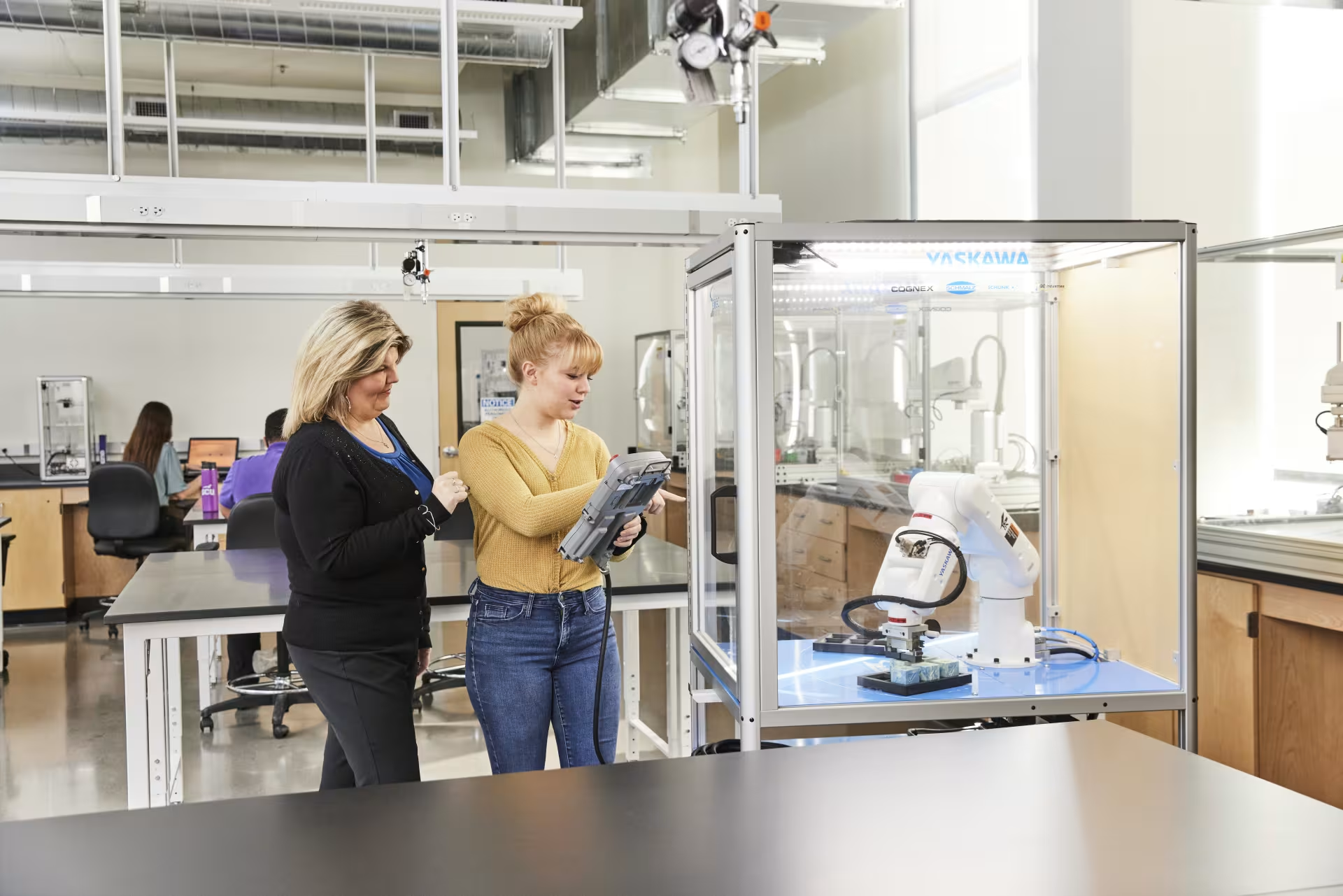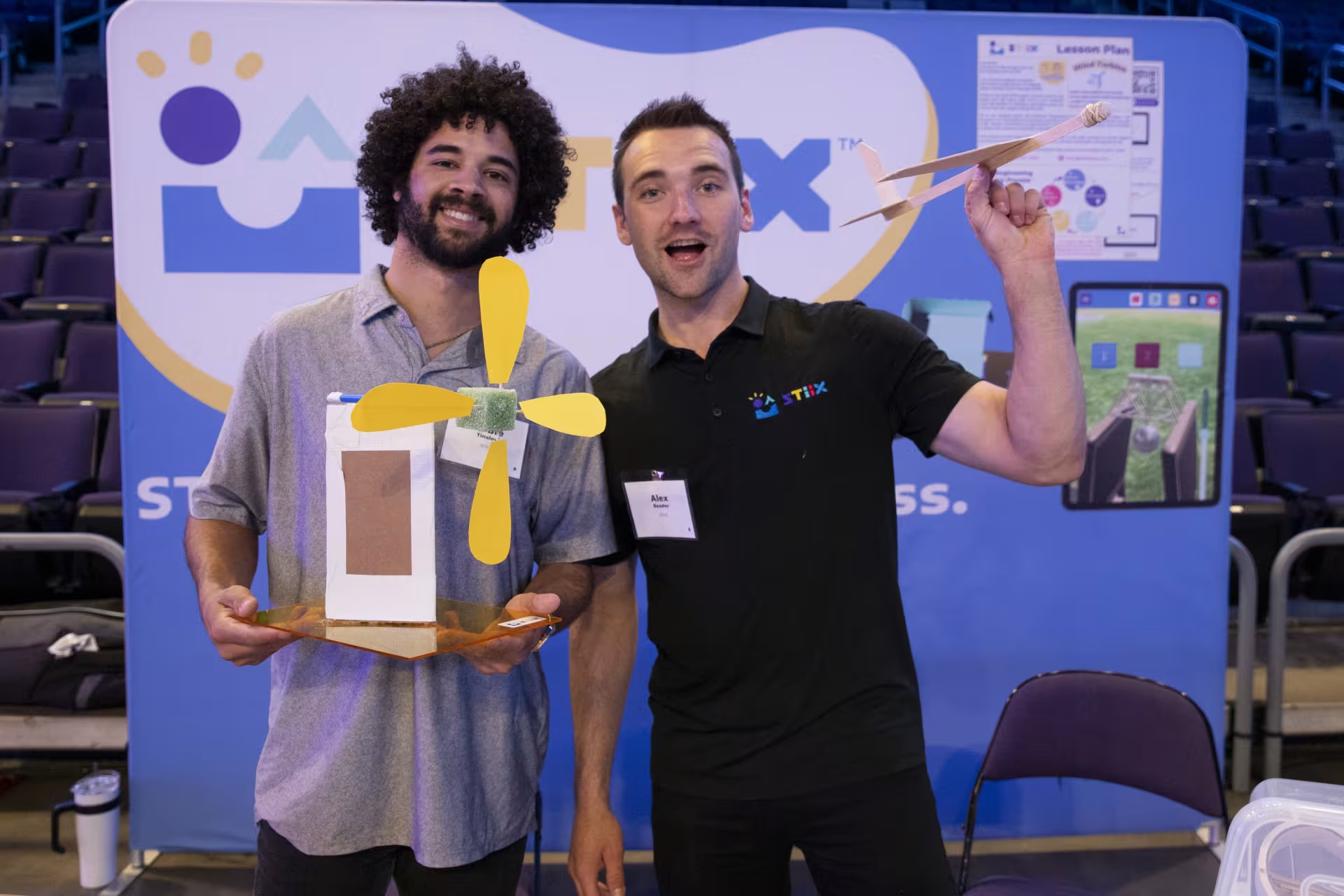
Master of Education in STEM for Secondary Education
Become Eligible for a Standard Teaching License in Nevada
The Master of Education (MEd) in Secondary STEM Education degree from Grand Canyon University is designed to equip STEM teachers with the skills to effectively cater to the requirements of science, technology, engineering and math students. Knowledgeable faculty teach coursework that can prepare you to work toward teaching subjects such as biology, physics and math in middle school and high school classrooms. Teaching strategies, classroom management techniques and methods of curriculum planning are at the heart of this master of education STEM program for secondary education.
This STEM graduate program is designed for teaching candidates in Nevada who are working on an Alternative Route to Licensure (ARL). You have the opportunity to continue working in the classroom while advancing your education and qualifications with a master’s degree online.(See disclaimer 1) Upon graduation, you may be eligible to pursue a standard teaching license in Nevada.

This program is only available in Nevada, but GCU offers a similar program in your state!
Up to 12 credits or 1/3 of the total program requirements in transfer (whichever is less)
Credits: Fill out the Lopes Eval to find out what will transfer
Admission Requirements (Master's)
- Undergraduate Degree*
- 2.8+ GPA
OR 2.5+ Unweighted GPA and
- GMAT: 500
- GRE: 300 combined**
Admission requirements may differ based on degree level, program and modality, or transfer status. Some programs of study may require a higher GPA and/or other qualifying criteria for admission. Please review full admission and program requirements in the University Policy Handbook.
* Degree must be from an accredited college or program that has been approved by GCU.
** Combined verbal/quantitative, after August 2011 (1,000 combined verbal and quantitative, prior to August 2011).
Reasons To Pursue Your Master of Education STEM Degree
Upon graduation of this master’s in STEM education online degree, you may be qualified to teach in 6-12 grade classrooms and support the multiple subjects within the STEM field. Current educational research and modern teaching techniques are the cornerstones of the classwork. Courses in adolescent development and psychology can teach you how to best meet the needs of every challenging situation.
STEM teachers are experiencing heightened interest, given the growing number of individuals looking to pursue careers in the expanding fields of science, technology, engineering and mathematics.(See disclaimer 2) As of 2022, over half of the school districts in the U.S. reported staffing shortages in STEM departments.(See disclaimer 3) When you earn your master of education STEM degree, you have the opportunity to help prepare the future generations of scientists, technologists, engineers and mathematicians to help fill these shortages.
Earn Your Master’s in STEM Education Online
This STEM graduate program at GCU is an online program, which allows you the ability to work while attending school. This program’s online classes offer flexibility and convenience, enabling you to manage your current responsibilities while working toward the advanced degree that can assist you in furthering your career qualifications. The online learning platform facilitates academic discussions with peers and instructors.(See disclaimer 1)
This Degree Is Offered Online
Focus Your MEd Coursework for Secondary STEM Classrooms
Earn your MEd online at GCU so you can remain in the classroom, earn your master’s and work toward earning your standard teaching license.
Coursework in the master of education STEM program for secondary education includes:
Current trends in education
Classroom management techniques
Methods of curriculum planning
Adolescent development (cognitive and socioemotional)
Tips for motivating adolescents
STEM content teaching strategies
Methods for working with English language learners
Special education process and requirements

Careers With a Graduate Degree in Secondary STEM Education
The master’s degree in secondary STEM education can help prepare graduates in Nevada to apply for a standard teacher licensure to teach in science, technology, engineering and math classrooms in grades 6-12. Upon graduation, you might pursue teaching positions in secondary and postsecondary settings.
GCU Is Institutionally Accredited Institutionally
Since teachers are charged with nurturing the academic development of their students, it’s important to ensure that the quality of your own education is well-respected. GCU is an institutionally accredited university — a designation that reflects the quality of our degree programs. Further, this MEd in secondary STEM education has received complete accreditation from AAQEP until June 30, 2026.
MEd in Secondary STEM Education FAQs
Whether you’re already a working STEM teacher or you’re just beginning to explore your potential career path in education, you may have some questions. Explore the frequently asked questions and answers, which may help your decision-making process when deciding on a STEM education master’s program.
What are the four components of a STEM education?
What is the most popular STEM career?
What makes a STEM degree worth it?
Program Curriculum
Core Courses

Prepare for standard licensure as a STEM teacher in secondary education with GCU’s STEM graduate program. Apply today for enrollment!
Excluding observational and practice-based experiences and student teaching.
- Feder, T. (2022, March). The US Is in Dire Need of STEM Teachers. Physics Today. Retrieved on Aug. 3, 2023.
- Schepeler, C. (2022, Feb. 7). STEM Teacher Shortage Isn’t a STEM Problem. SmartBrief. Retrieved Aug. 3, 2023.
- National Science Teaching Association Board of Directors. (2020, Feb.). STEM Education Teaching and Learning. National Science Teaching Association. Retrieved Aug. 3, 2023.
- Engel, I. (2023, March 18). The 7 Fastest-Growing STEM Jobs that Pay Over $100,000. CNBC. Retrieved Aug. 3, 2023.
- Edutopia. (2012, Nov. 2). Infographic: The Value of a STEM Education. Edutopia. Retrieved Oct. 9, 2025.


